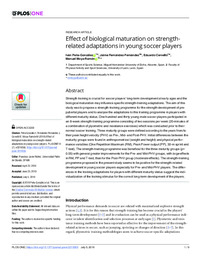Por favor, use este identificador para citar o enlazar este ítem:
https://hdl.handle.net/11000/35227
Effect of biological maturation on strength-related adaptations in young soccer players
Título :
Effect of biological maturation on strength-related adaptations in young soccer players |
Autor :
Peña-González, Iván 
Fernández-Fernandez, Jaime 
Cervelló, Eduardo
MOYA-RAMÓN, MANUEL  |
Editor :
Public Library of Science |
Departamento:
Departamentos de la UMH::Ciencias del Deporte |
Fecha de publicación:
2019 |
URI :
https://hdl.handle.net/11000/35227 |
Resumen :
Strength training is crucial for soccer players’ long-term development at early ages and the biological maturation may influence specific strength-training adaptations. The aim of this study was to propose a strength-training programme for the strength development of pre-pubertal players and to analyse the adaptations to this training programme in players with different maturity status. One hundred and thirty young male soccer players participated in an 8-week strength-training programme consisting of two sessions per week (20-minutes of a combination of plyometric and resistance exercises) which was conducted prior to their normal soccer training. Three maturity groups were defined according to the years from/to their peak height velocity (PHV) as Pre-, Mid- and Post-PHV. Initial differences between the maturity groups were found in anthropometrical (weight and height) and physical performance variables (One Repetition Maximum (RM), Peak Power output (PP), 30-m sprint and T-test). The strength-training programme was beneficial for the three maturity groups (p< 0.05) with general greater improvements for the Pre- and Mid-PHV groups, with large effects in RM, PP and T-test, than for the Post-PHV group (moderate effects). The strength-training programme proposed in the present study seems to be positive for the strength-related development in young soccer players especially for Pre- and Mid-PHV players. The differences in the training adaptations for players with different maturity status suggest the individualization of the training stimulus for the correct long-term development of the players.
|
Área de conocimiento :
CDU: Bellas artes: Diversiones. Espectáculos. Cine. Teatro. Danza. Juegos.Deportes |
Tipo de documento :
info:eu-repo/semantics/article |
Derechos de acceso:
info:eu-repo/semantics/openAccess |
DOI :
https://doi.org/10.1371/journal.pone.0219355 |
Publicado en:
PLoS ONE |
Aparece en las colecciones:
Artículos Ciencias del Deporte
|
 La licencia se describe como: Atribución-NonComercial-NoDerivada 4.0 Internacional.
La licencia se describe como: Atribución-NonComercial-NoDerivada 4.0 Internacional.

 La licencia se describe como: Atribución-NonComercial-NoDerivada 4.0 Internacional.
La licencia se describe como: Atribución-NonComercial-NoDerivada 4.0 Internacional.
.png)